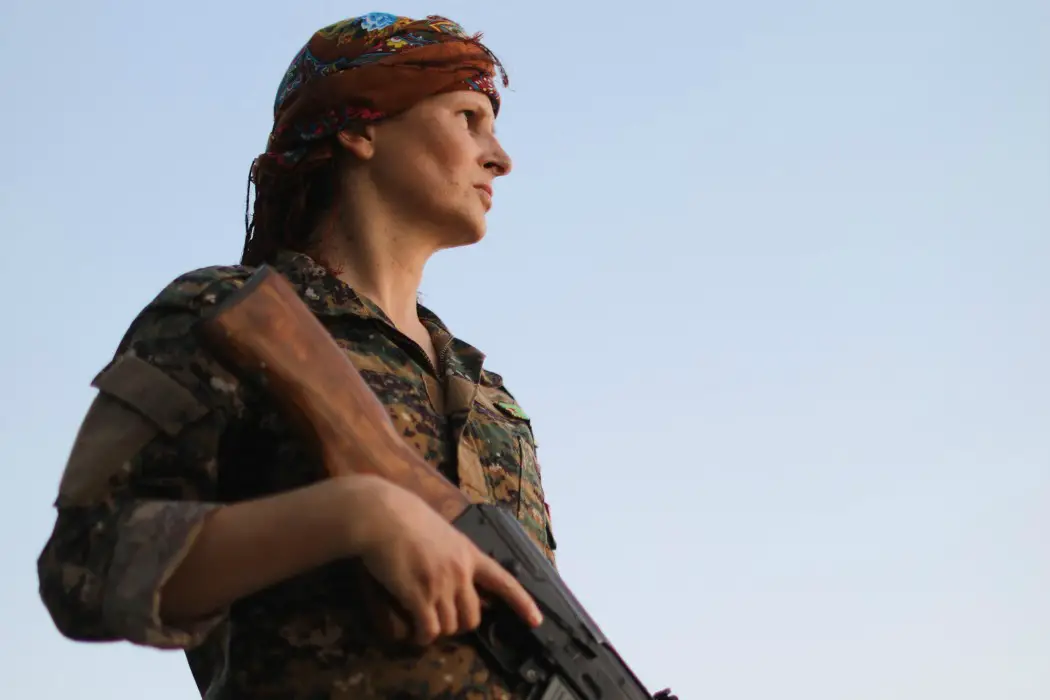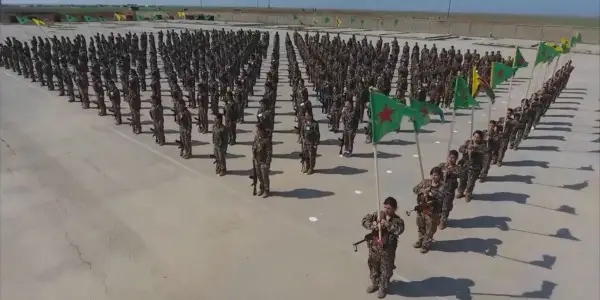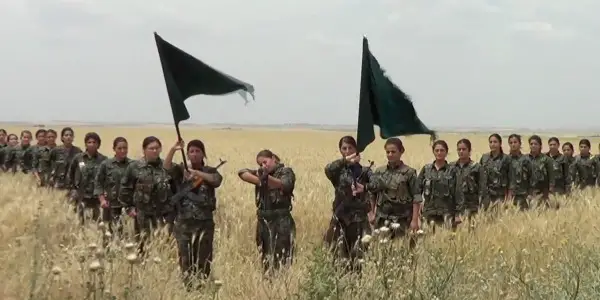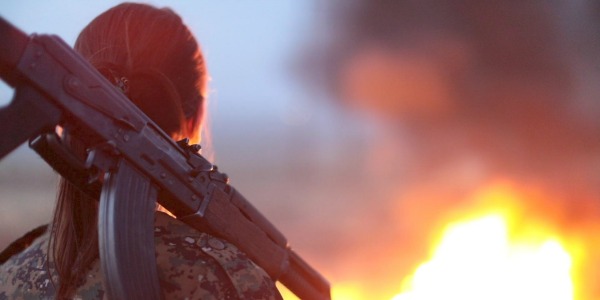FEAR US WOMEN: Empowering, Sobering, & Entrancingly Spectacular

Alex Arabian is a freelance film journalist and filmmaker. His…
In Fear Us Women, director David Darg immerses the viewer instantly at a YPJ outpost in Syria. We immediately feel as though we are there. In order to further add weight to the forces they’re up against, Hanna Böhman opens with a monologue, stating that ISIS members believe they go to hell if they’re killed by a woman. It’s an instant attention grabber, and the audience is enthralled for the rest of the 27-minute run time of Fear Us Women.
Böhman doesn’t have hate in her heart, she simply wants to maintain the beauty that remains in this world; she doesn’t believe that ISIS deserves to live among said beauty, which is why she fights with the YPJ. Fear Us Women takes audiences on an unprecedented journey alongside the all-female Kurdish armed forces fighting against ISIS, and it is a searing, gut-wrenching first-hand account.
A Brief Context For The Conflict
The Syrian conflict isn’t necessarily a religious one, but rather, a cultural and ethnic one. Kurds are Sunni Muslims, as is ISIS, the enemy that the YPG (People’s Defense Unit) and YPJ (Women’s Protection Units) are fighting against. However, Kurdish people are not Arab, and since they’re not Arab, they’re, in a sense, their own ethnicity.
The Sykes–Picot Agreement after World War I never gave the Kurds their own territory; there has never been a Kurdish country. Syria, Turkey, Iraq (where peshmerga, a Kurdish military group in Iraq which is more nationalistic to Iraqi Kurdistan, reside), and Iran are where predominant Kurdish populations are.
The YPG and YPJ have ties to the PKK, a democratic confederalist political party group in Turkey, contrary to the misconception that they are mostly anarchistic (they want a stateless Kurdistan) through their following of Abdullah Öcalan. Öcalan, founder of the PKK, was imprisoned by Turkey’s president, Erdoğan. Since then, with the help of social theorists such as Murray Bookchin, a leader in democratic confederalism theory, Öcalan’s viewpoints have changed from violent to relatively nonviolent regarding the Syrian conflict.

Leftist ideologies such as communism, socialism, anarchism, and now democratic confederalism have played an important role in the Middle East over the past 60+ years. For the sake of brevity, think of these political theories as various sides of the same coin in that everything is communally owned. The Arab Spring, though not a direct cause of the current Syrian conflict with ISIS (it’s a bit more complex than that; it’s devolved into a multi-sided proxy war), created the ongoing Syrian Civil War, which aggravated extremist jihadi groups and strengthened the YPG and YPJ.
The YPG and YPJ have been considered, in a way, the PKK of Syria, though this is another misconception. They are well-trained, but they use old weapons, as they don’t get any formal funding from the west. They’re backed by the west in the form of air-strikes and occasional air support (Siege of Kobani, Yazidis Gencodie), however, because they have a common enemy.
The bottom line is that Kurds want independence in Syria; they’re tired of being treated as second-class citizens. However, the YPG and YPJ has expanded to include Arabs and minorities that want to fight against ISIS. The YPJ are also fighting for the liberation of women in the Middle East.
“Fear us women, oh enemies of humanity, for you who die by our hands will burn in hell forever.”
That is the poem Böhman wrote for members of ISIS, using their ideologies against them. She first heard about ISIS in 2014, watching the horrific videos of the slaughtering of women, kidnapping of children, and relentless atrocities against humanity. She noticed that they didn’t have a significant adversary. That is until she researched the YPJ. She felt the urge to join.
Böhman was also driven by other factors; she had never been happy doing what she did to make a living, ranging from fashion modeling to biking. She had also felt fortunate to grow up in the peaceful country of Canada, and wanted to pay it forward. The YPJ’s primary goal is to bring women’s rights to the Middle East. This is the story: women protecting women, fighting against unrelenting evil; this is Hanna Böhman’s story.
The guerrilla footage on ground zero is overwhelmingly potent in Fear Us Women as we follow the YPJ. Again, these aren’t only Kurds, there are women from all over the world joining in unity to fight against a common enemy. Darg follows Böhman, a sniper, from her training days, to unit to unit, to battle, to the war-torn Kobani, to footage of burial of fellow comrades, intertwining it with various segments of ISIS atrocities. As Böhman describes it, due to the lack of significant funding and ammunition, the outpost looks like something out of Mad Max.

Böhman views death in a very matter-of-factly way; we can all die at any time. She explains that one has to come to terms with the fact that they may die; one has to accept death. She is somebody who lived a quiet but, in her eyes, unfulfilling life in Canada. Oftentimes we take years to find our purpose on this earth.
In Böhman’s case, she didn’t discover her’s until her mid-40s. She’s now content with being detached from the “outside world,” mostly separate from modern technology. It’s a tired, backwards, antiquated style of thinking that women aren’t as capable as men. Though most people hopefully don’t need any reaffirmation, Fear Us Women shows with astonishing footage that women more-than-capable in combat.
Let us use a comparatively progressive country such as the U.S. for context. Women weren’t allowed to serve in the military as anything other than nurses until 1976, when the first women were admitted to the United States service academies: U.S. Military Academy at West Point, U.S. Naval Academy at Annapolis, and the Air Force Academy to be. It wasn’t until 1991 and 1992 that women were first deployed in combat during Operation Desert Storm. It wasn’t until 1998 that the first women fighter pilots flew combat missions off and aircraft carrier in Operation Desert Fox, Iraq.
Then, take into consideration how oppressed women have been in the U.S. military since joining in combat with men, and it’s staggering. Now, look at some of the countries in the Middle East and how they treat women still, and it’s absolutely baffling.
Battles, Trials, & Tribulations
Böhman, a tomboy growing up, finds refuge bonding with her unit in between battle; it is also where the viewer can find harmony amidst the footage of explosions, martyred cities, and fleeing refugees in Fear Us Women. The edge of battle, the fight or flight situations bring these brave women close together.
However, the YPJ isn’t mutually exclusive, they fight alongside the men in the YPG in equality. Perhaps most enthralling is Böhman’s account of the biggest battle she faced, that of Tell Abyad, where she fought on the front line to cut off supplies from ISIS to Turkey. We see first-hand footage of this battle, including airstrikes, bullets slicing through the air, and massive celebrations after a rewarding victory, successfully accomplishing stopping ISIS in their tracks.
Throughout the entirety of Fear Us Women, Böhman remains entirely calm, considering the conflict she’s in the middle of. She enjoys the fight, embraces it; it is a part of her past and present. She is fearless. She is filled with empathy. However, her selfless journey to fight for the Kurdish cause and that of women’s rights in the Middle East has had personal consequences: severe malnutrition. Böhman’s struggle with rapid weight loss shows one of the many stresses of war. The YPJ does everything on the dirt: eat, sleep, train, and fight.

Malnutrition or not, she’s one of the most resilient people I’ve ever seen. Böhman doesn’t let anything bother her. What she does every day takes more than courage; it takes a special kind of mental clarity and toughness that her and her comrades all possess. The death and rape threats Böhman receives from her enemies online reflect far more sinister mental stresses of battling ISIS. She and her comrades endure. She’s inspired countless people to make changes in their lives, from benign to major life choices. These stories that people tell her of her impact give her gratification.
On the contrary. Böhman’s heard it all; people call her crazy and other names meant to discredit her path in life. What she isn’t is insane. What she isn’t is a model-turned soldier. What she is, is a badass fighter for justice, not just for women and Kurds, but for the world. It’s people within the YPJ and YPG that help give the world hope for a more peaceful future. ISIS has proven to be relentless, and if they won’t stop, somebody needs to defend against their brutality.
Fear Us Women: 27 Enthralling, Mandatory Minutes
The Genocide of Yazidis by ISIS coverage and story is the most upsetting. It’s also one of the most well-known recent atrocities against humanity. During the genocide, the YPG and YPJ stopped ISIS from completely from exterminating the Yazidis with the help of airdrops from the U.S., U.K., and Australia. It was basically a modern-day Sparta versus the Persian Empire event.
Fear Us Women shows the aftermath, some of the effects the genocide had on the Yazidi women who were tortured. ISIS captured around 3,000 women and young girls and sold them into sex slavery. The footage shows that these men have no concept of morals.
Fear Us Women gets intensely real and grim, as one might expect. This isn’t a bad thing; the world needs to know what the YPJ is doing. The ever-expanding Olivia Wilde, Diego Traverso, Bryn Mooser, Hayley Pappas, Alissa Van Volkom, and Ivana Kirkbride have produced something truly special in Fear Us Women. It deserves as wide of an audience as some of the biggest blockbusters of this summer.
I don’t think I’ve ever seen a more powerful or empowering 27 minutes in my entire life. Fear Us Women uses Böhman’s consistent narration, Darg’s daring direction and coherent editing, and real footage to expose what the YPJ is doing for women and Kurdish liberation in the Middle East.
Do you relate to Hanna’s story? Do you know anyone who’s fought in the Middle East, YPJ/YPG or otherwise? Have you ever considered volunteering for the YPJ or YPG?
Fear Us Women was released on November 9, 2017 in the U.S.
Does content like this matter to you?
Become a Member and support film journalism. Unlock access to all of Film Inquiry`s great articles. Join a community of like-minded readers who are passionate about cinema - get access to our private members Network, give back to independent filmmakers, and more.
Alex Arabian is a freelance film journalist and filmmaker. His work has been featured in the San Francisco Examiner, The Playlist, Awards Circuit, and Pop Matters. His favorite film is Edward Scissorhands. Check out more of his work on makingacinephile.com!













